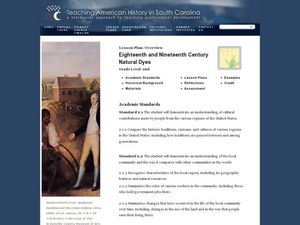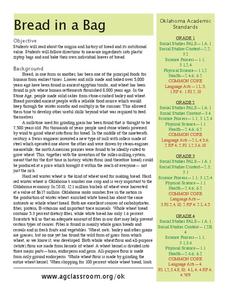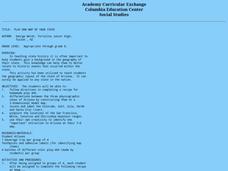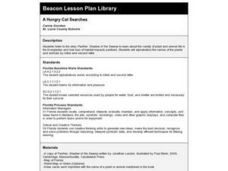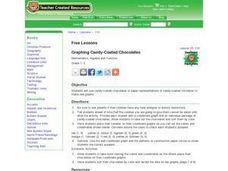Curated OER
Ravishing Rings (Multiplication with a Snack)
Students understand multiplication through the use of snack manipulatives. In this multiplication lesson, students solve a multiplication problem using pretzels and then create and answer original problems. Students analyze how they got...
Curated OER
Taste Buds
Students investigate taste buds. In this biology lesson, students taste several sweet, sour, and salty foods to identify how their taste buds play a role in how things taste.
Curated OER
Beanie Baby
Students will explain the importance of soybeans. In this science lesson, students participate in making a "beanie baby" necklace. Additionally, students observe their soybeans for germination and growth for 7-10 days. Students record...
Curated OER
Insect Homes
Students investigate student homes. In this insect homes lesson,students observe insect homes. Students visit a campsite and gather information about insect homes. Students examine and record an insect home on a worksheet. students...
Curated OER
Buzzy, Buzzy Bee
Students simulate honeybees pollinating flowers. In this pollination lesson, students role-play the process of pollination over the course of several seasons. Students graph results and share their graphs with the class.
Curated OER
Pond Life
Students explore pond ecosystems. In this living environment lesson, students observe the local pond and identify the living things they find by drawing pictures. Students observe organisms that were found in the pond by using a...
Curated OER
Studying Birds in the Field
This is a well-designed science activity which helps students learn the behavior of different species of birds. Working with partners and in small team, students learn to scientifically observe birds.
Curated OER
Animals In Winter
Students read story Animals in Winter, and explore similarities and differences in how humans and other animals prepare for survival in winter. Students create class book that compares and illustrates different ways humans and animals...
Curated OER
Pond Theme Unit
For this pond theme worksheet students research facts on pond life. Students complete comprehension questions, crosswords, word search, and math puzzles. Students write a short report.
Curated OER
World Hunger
Young scholars discover the benefits of balanced nutrition. In this service learning lesson plan, students read Beatrice's Goat and create a poster featuring the Heifer International Project.
Curated OER
Eighteenth and Nineteenth Century Natural Dyes
Second graders explore the work of Americans when it came to coloring materials. For this interdisciplinary lesson, 2nd graders follow the provided steps to make natural goldenrod dye from scratch.
Curated OER
Bread in a Bag
Learners explore wheat. In this bread making lesson, students make their own loaf of bread and discover the history behind wheat. They work in pairs to follow step-by-step instructions for making the bread. This lesson includes a...
Curated OER
2: Isle of Shapes - Based on the Puerto Rico Quarter Reverse
Students identify both two and three-dimensional shapes. In this geometric shapes lesson, students listen to a teacher led lesson about the island of Puerto Rico. They look at the symbols and shapes on "Puerto Rico Quarter Reverse" on a...
Curated OER
Recycle, Reduce, Reuse and Save a Tree
Students examine how to save and protect trees. In this conservation lesson, students read books about the usefulness of trees, write ideas in their journals about how trees can be used, and make a book of ways to protect trees.
Curated OER
Sound Vibrations
Students play their own straw kazoos and understand that vibrations are responsible for the sounds we hear. Additionally, they learn that sound vibrations can travel through different mediums. Students experience vibrations through...
Curated OER
Digestive System Journey
Students explore what happens to the food they eat as it passes through their body. They demonstrate their understanding of the digestive system functions by choosing to create a poster, build a model, produce a multimedia presentation,...
Curated OER
Logo Design Basics: Your Name Here
Students become familiar with the fundamentals of graphic design to develop a logo. In this logo design instructional activity, students generate their own two logos using their own name and a personal hobby as inspiration. Students...
Curated OER
Investigating Local Ecosystems
Students observe a local area for living organisms and their habitats. In this local ecosystems lesson plan, students complete an online field journal. Students share their findings and sort them into categories. Students visit a...
Curated OER
Room to Grow
Students examine radish plants and compare how they grew based on how closely the seeds were sown. In this life science lesson plan, students pretend to be growing plants crowded together, then examine how the radishes look based on how...
Curated OER
Play Doh Map of Your State
Students create a state map using Playdoh. In this hands-on state geography activity, students work in groups to form a three-dimensional map of their state using Playdoh made at home following a (given) recipe. Students use four colors...
Curated OER
A Hungry Cat Searches
Students listen to story Panther: Shadow of the Swamp, and examine how loss of habitat impacts panthers in the Everglades; students alphabetize names of plants and animals found in the Everglades by initial and second letter.
Curated OER
Graphing Candy-Coated Chocolates
Students place pieces of candy on their coordinate graphs as the teacher calls out the colors and coordinates embedded in the plan. The teacher circulates around the class to check each student's answers for accuracy.
Curated OER
Why Is The Sea Salty?
Students observe how salt concentration increases in water and how salt remains after water evaporates. For this salty sea lesson plan, student use rock salt, water, containers, and strainers to observe that salt increases each time new...
Curated OER
Bubbles
Students observe the characteristics of bubbles. In this scientific inquiry activity, students use a bubble solution and a wand to make bubbles and observe their characteristics. Students identify the shape and the color of the bubbles.












